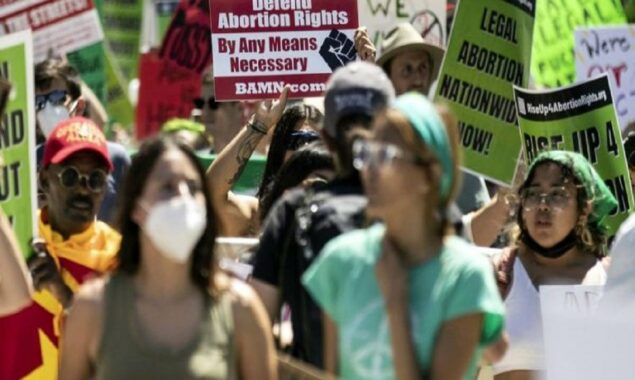US army commander demoted for making fun of Jill Biden’s pro-abortion stance
Gary Volesky is a retired three-star general and former top army spokesperson....

Economic fallout from abortion bans will hit the poor hardest. (credits: Google)
Economists and reproductive policy experts warn that abortion prohibitions will hurt economically vulnerable women already grappling with rising inflation and recession fears.
The backlash to the US Supreme Court’s decision to overturn Roe vs Wade has reverberated fast through US states, which must now decide how to regulate the process — or allow it at all.
Nearly 30mn women between 15 and 44 live in states that have prohibited or will ban abortion following the verdict. According to the CDC and Guttmacher Institute, these states had 290,000 legal abortions in 2020.
These states have the highest poverty rates for childbearing women. Nearly a quarter of 15- to 44-year-old women in Louisiana and Mississippi live below the poverty line.
The most economically vulnerable women will likely bear the burden of statewide prohibitions, which are predicted to exacerbate existing societal imbalances.
You’re viewing an interactive graphic. This is probably because you’re offline or have JavaScript disabled.
“Rich people may travel and order medications online.
Wealthier people may likely avoid state regulations, but impoverished people can’t, says UCSF demographer Diana Greene Foster.
Middlebury College economist Caitlin Knowles Myers agreed, saying economic imbalances will grow as state abortion prohibitions stay.
“These are poor, marginalised women. Myers said [they] are unlikely to get paid leave or decent childcare. “Their families will suffer economically as a result,” says the author.
Restrictions on abortion providers influence women’s employment.
Itay Ravid, a law professor at Villanova University, and Jonathan Zandberg, an economist and lecturer at The Wharton School at the University of Pennsylvania, found that restricting abortion providers widens the wage gap between men and women in a state due to women leaving the workforce or choosing lower-paying jobs.
“Every time such a law is applied, we observe a 5% decline in their income,” said Zandberg.
You’re viewing an interactive graphic. This is probably because you’re offline or have JavaScript disabled.
States where abortion is or will be prohibited or highly limited will experience the impacts most intensely, but even in legal states, women from ban states will put additional pressure on providers.
“Abortion tourism could affect other states. Ravid said it could cause suppliers to stop offering the service and raise prices.
In a May 10 meeting, days after a draught of the decision to overturn Roe versus Wade surfaced, Treasury secretary Janet Yellen cautioned members of the US Senate that “eliminating the ability of women to decide when and whether to have children will damage the economy and set women back decades”.
The Turnaway Study from the University of California, San Francisco monitored over 1,000 women who got or were denied an abortion for 10 years. Women who are denied abortions are twice as likely to be unemployed and three times as likely to be poor.
Most abortion seekers in the research couldn’t afford a child.
“Often people want to have kids in the future, they just don’t want the circumstances they’re in now,” said Greene Foster, who conceived and led the Turnaway Study.
You’re viewing an interactive graphic. This is probably because you’re offline or have JavaScript disabled.
Sarah Miller, a University of Michigan economist, reviewed the credit records of Turnaway Study participants before and after pregnancy.
This January research indicated that women who were denied an abortion experienced greater financial distress than those who had one, despite starting in equal financial situations. Those turned away saw their debt climb by 78% and their credit ratings plummet below 600.
Denying abortions affects the entire family.
The Turnaway Study indicated that children of women denied abortions are more likely to live in poverty and five times as likely to live in a household that cannot afford basic living expenditures.
You’re viewing an interactive graphic. This is probably because you’re offline or have JavaScript disabled.
100,000 people will be prohibited from getting abortion treatment in the first year alone due to state laws, according to Myers.
This estimate assumes that persons in states that ban abortion can travel and that states that allow it can handle the surge of patients. Myers expects Illinois, Kansas, and Florida to be abortion hotspots.
Planned Parenthood declared last week that it won’t give medication abortions to those travelling from areas where abortion is illegal. Some Republican politicians want to arrest residents who cross state lines for an abortion.
Some Republican senators, like Marco Rubio and Steve Daines, want to help women with unwanted pregnancies pay for daycare. Many of these measures are paid by Social Security or the Earned Income Tax Credit, which aids impoverished families with some income.
In Mississippi, a woman’s maximum monthly welfare payout is $220, which isn’t enough to maintain a family. Mississippi has a family cap on welfare if she’s already on it and has another child, Myers said.
This vulnerable group’s net is highly tattered.
Catch all the Business News, Breaking News Event and Latest News Updates on The BOL News
Download The BOL News App to get the Daily News Update & Follow us on Google News.